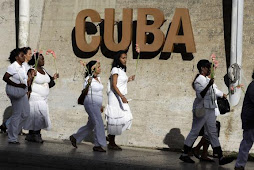U.S. lawyers examine promises, pitfalls in Cuba
By SABRINA RODRIGUEZ 6/12/15 8:24 AM EDT
Companies may be ready for trade and investment opportunities in Cuba,
but Cuba isn't quite ready for them — at least that's what a group of
U.S. lawyers say.
More than 25 lawyers, mostly from Miami-based firms, recently visited
Cuba to explore the communist-led country's physical and legal readiness
to handle what many hope will be a spike in international investment,
now that the U.S. is restoring diplomatic ties. Seaports, the rights of
foreign investors and the future of the U.S. embargo all were discussed
during meetings with Cuban lawyers and journalists.
"It's our obligation as international lawyers to meet with our
counterparts in Cuba and figure out what challenges we face with trade
and investment there," said Peter Quinter, chairman of the Florida Bar's
International Law Section, who organized the three-day trip to Havana.
Since President Barack Obama announced last year that the U.S. and Cuba
would be restoring diplomatic ties after more than five decades of
estrangement, the U.S. has removed Cuba from its list of state sponsors
of terrorism and loosened some trade and travel restrictions — to the
chagrin of many Republicans in Congress.
The group went to Cuba in late May in response to U.S. companies'
inquiries about the island's investment potential in the wake of Obama's
announcement.
But the lawyers learned there is a great deal of uncertainty about
whether Cuba, where the state still controls much of the property and
economy, is ready to handle an influx of foreign commercial interest.
The government there has rewritten some of its laws, but there are
concerns that Cuba still doesn't offer enough protection for foreign
investors.
"There aren't any real protections for investors in a practical sense,"
said James Meyer, one of the lawyers on the trip.
That's not surprising, said Carl Meacham, director of the Americas
Program at the Center for Strategic and International Studies. "Cuba's
authoritarian government isn't used to the framework of capitalism and
transparency of markets," Meacham said. "They're going to have to make
changes if they want to get meaningful investment."
Meacham predicted that Cuban leaders eventually "will be forced" to make
the changes necessary, especially due to the allure of the U.S.
commercial sector. "Will it happen in the short term? No, but in the
long term, yes," he said.
The island is already working to improve its seaport facilities, which
are not equipped to handle much trade. In the past year, Cuba has taken
bids from foreign companies to raise money to build infrastructure at
Mariel, the main port. Due to the longstanding embargo, U.S. companies
cannot bid.
Lifting the embargo will require an act of Congress, and it's not likely
to happen anytime soon, especially given a Republican majority. But even
if the embargo is lifted, Cuba has to change its laws to make it less
risky for foreigners to invest, said Matias Travieso-Diaz, a retired
attorney and author of "The Laws and Legal System of a Free-Market Cuba:
A Prospectus for Business."
"Investor confidence is critical in Cuba reestablishing its economy," he
said.
Because the state plays such a large role in Cuba's economy, it will
likely profit from outside investment — at least for the time being.
"The reality is that right now, the Cuban state and its private sector
do not work separately," Meacham said. "But in the long term, folks in a
more active private sector will demand transparency and accountability
from the government."
Sen. Marco Rubio (R-Fla.) and other critics of the president's move have
warned that they will try to derail the renewal of ties to the island
through funding restrictions and other means. Rubio, a GOP presidential
candidate, has pointed to human rights problems in Cuba as one of many
reasons he opposes the Obama administration's decision.
Regardless of congressional rumblings, many in the private sector are
still interested in the opportunities Cuba offers.
"There's a boom in tourism, and the exuberance is unlike anything I've
ever seen," said Meyer, who has visited Cuba multiple times. "Just the
thought that the U.S. [companies] might be going to Cuba has people
enthusiastic and pouring money into the island."
Despite stringent regulations, attorneys are working with clients who
are considering investing on the island.
"I encourage people to readily explore business opportunities and
potentially invest in Cuba," Quinter said. "Risks are high for
investing, but right now, so are the rewards."
Source: U.S. lawyers examine promises, pitfalls in Cuba - Sabrina
Rodriguez - POLITICO -
http://www.politico.com/story/2015/06/us-lawyers-examine-promises-pitfalls-in-cuba-118923.html
Subscribe to:
Post Comments (Atom)





No comments:
Post a Comment